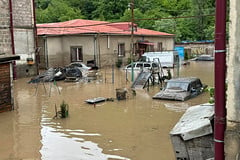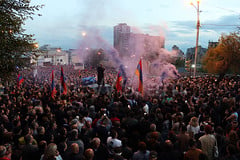
The question of Nagorno-Karabakh is unlikely to be discussed any time soon after Azerbaijan took control of the region in September. Europeans should now diplomatically engage with all sides to prevent further escalation, while supporting Armenia’s domestic political stability and strengthening its defence capabilities. This is noted in a joint article by Marie Dumoulin and Gustav Gressel—and which was published on the ECFR portal. The article continues as follows, in particular.
For now, Armenians seem to blame Russia more than their government for what has happened. This is consistent with the rapid deterioration in Armenian-Russian relations since the 2020 war and the Moscow-brokered truce.
With Azerbaijan taking back full control of Nagorno-Karabakh, the 35-year conflict over the disputed territory has now de facto turned into an interstate conflict over the delimitation, or the establishing of the outer limits, of an international border.
Increasing Azerbaijani rhetoric referring to southern Armenia as “western Azerbaijan” has fuelled Yerevan’s concerns about possible irredentist claims over the territory of Armenia itself.
The issue of border delimitation has been touched upon in the ongoing peace negotiations between the two countries. But, Azerbaijani president Ilham Aliyev regularly sends signals of his unwillingness to agree on anything in a Western-led negotiating format and has instead advocated for a settlement involving “regional actors” ie, Russia and Turkey.
Turkey, Azerbaijan, and Russia, in such a scenario, could team up in a regional format that excludes the EU and United States, in order to arm-twist Armenian prime minister Nikol Pashinyan into concessions, including the establishment of a land ‘corridor’ – branded as the Zangezur corridor – through Armenia’s southernmost Syunik region. Here, Pashinyan’s hand would be weak and Armenia’s domestic stability under constant threat, possibly opening avenues for internal destabilisation and making the country more vulnerable to external meddling.
Even without this negotiation format Armenia faces such threats. Shortly after Azerbaijani forces retook Nagorno-Karabakh, Pashinyan accused Russia of making “public calls for a change of power in Armenia, to overthrow the democratic government”.
However, Azerbaijan's current military positions at Armenia’s border and the tremendous disbalance of power between the two countries has also raised the Armenian government’s fears of a possible invasion. Azerbaijan took three weeks to build up and prepare the attack in Nagorno-Karabakh, as it enjoyed military support from Turkey and Israel. It could take approximately the same time to attack the Syunik region and Azerbaijan would probably prefer to do so before winter kicks in.
Both scenarios could carry dramatic consequences for Armenia, not least because its fragile democracy would be endangered by domestic discontent as well as Russian pressure. But it would also be very damaging for the EU, which has engaged resources and political capital in its mediation efforts between Armenia and Azerbaijan. Its credibility would be significantly damaged if it were to let regional actors play with borders in its immediate neighbourhood, and would discredit its commitment to Ukraine’s territorial integrity.
Furthermore, the establishment of a land corridor through the Syunik region poses significant risks for Europe, whether established through militarily means and fully controlled by Azerbaijan, or through negotiations and formally controlled by Russian forces. This would entail Turkey and Azerbaijan, possibly with Russia’s support, gaining de facto control over a corridor connecting the Black Sea to the Caspian Sea, one of the key routes connecting Europe to Central Asia and China.
The EU should act to prevent such a scenario via addressing short, medium, and long-term concerns:
Preventing further escalation
The first priority should be to deter an Azerbaijani attack on the territory of Armenia through high-level political engagement with the government in Yerevan. This would show that European leaders care for Armenia. But Europeans should also engage with Azerbaijan and Turkey. The consequences of a possible attack, including the prospect of restrictive measures, should be made clear to the Azerbaijani leadership.
Extending the mandate of the EU mission to Armenia (EUMA) to better trace ceasefire violations and providing it with technical means to exert a more thorough monitoring of the border may also be instrumental in preventing further escalation.
Strengthening defence capabilities
Armenian membership in the Collective Security Treaty Organisation (CSTO) should not be an excuse to not help it build up its defence capacity. Rather, the EU should be open to using the European Peace Facility to equip the Armenian armed forces. Delivering equipment will also require EU engagement with Georgia to provide a transport corridor.
And while most eyes are on military equipment, the EU is best suited to provide other kinds of assistance to strengthen Armenia’s defence capacity. Assistance to reform the administration (Ministry of Defence), logistics, military education, training, and operational and tactical planning and procedures need to be put in place to enable Armenia to make use of new equipment effectively.
Recently India has emerged as a new provider of hard security assistance to Armenia and in this role is less suspect to Moscow and Tehran than the West. Strategic consultations with the government in Delhi on supporting Armenia militarily should also form part of the European effort.
Reforming and re-equipping Armenia’s armed forces so they are able to withstand an Azerbaijani offensive will take several years, while to prepare an Azerbaijani offensive could take a few weeks. While Armenia remains highly vulnerable, Europe should exert diplomatic and economic pressure to keep the situation from escalating.
Supporting a peace settlement
In parallel, the EU should step up mediation efforts, and use the fact that Nagorno-Karabakh is no longer part of the negotiation to reframe the discussion around the issue of borders. Mediation should aim for an agreement on the delimitation and opening of borders – including the border between Armenia and Turkey – in a way that provides security to all sides. This discussion will not be easy, but it could allow for technical solutions to problems that are currently framed in terms of sovereignty: primarily the question of a transit route through Armenian territory to connect Azerbaijan and Nakhichevan.
As part of a future peace settlement the EU could offer technical support and possible investments to facilitate transit and connectivity in the wider region to incentivise the opening of borders.
Last but not least, the EU should work towards increasing Armenia’s societal resilience. In the short term, humanitarian support will be needed for Nagorno-Karabakh refugees. Their integration into Armenian society will be key to ensuring future domestic political stability in the medium and long term. Beyond this, the EU can also contribute to institutions and capacity building in the country, to make it less vulnerable to both domestic instability and external pressures.
Ultimately, the EU also needs to manage Armenia’s expectations and should refrain from making unachievable promises. By doing so, it risks exposing Armenia to greater threats not just from Azerbaijan, but also from Russia, in which case it will end up bearing responsibility for a potential worsening situation, hurting its credibility in the region.
The EU cannot make Iran, Russia, Turkey, and Azerbaijan go away – nor will it completely replace them. But it can support Armenia in balancing their interests without having to make exorbitant sacrifices, and it can help avoid Armenia’s imbalanced dependency on one regional power that would leave it at its mercy.






















